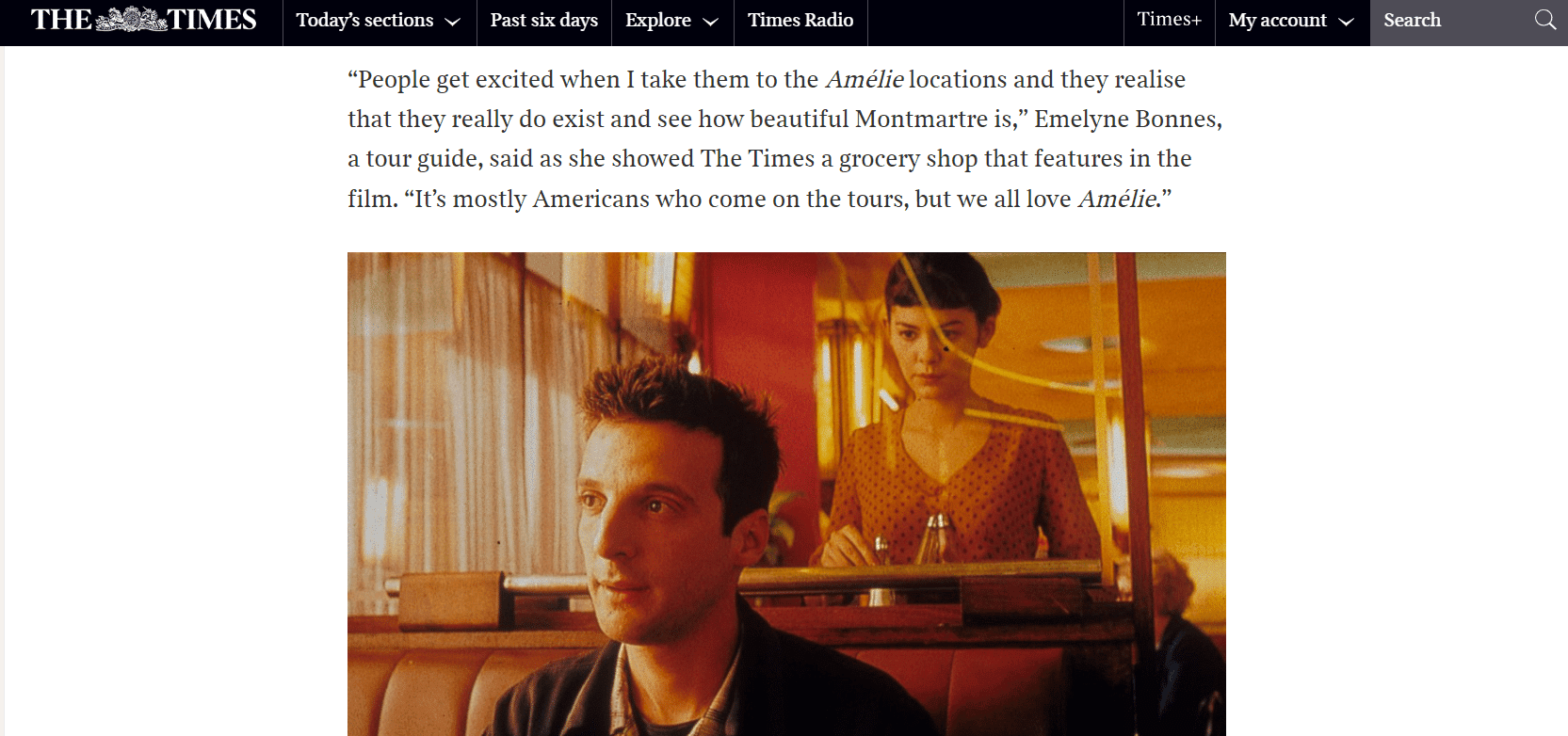| A Spectacular Celebration of Sports |
The Paris Olympics 2024 is gearing up to be one of the most exciting and anticipated sporting events of the decade from Fri, Jul 26, 2024 – to Sun, Aug 11, 2024 then from August 28 to September 8, the Paralympic Games. Enjoy this Paris Olympics 2024 grand spectacle article, covering everything from the history of the Olympics in Paris to the expected highlights of the 2024 games. Join us as we explore the rich tapestry of sportsmanship, culture, and unity that the Paris Olympics promises to deliver.
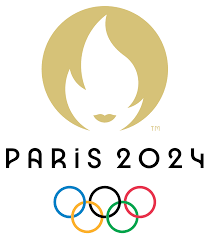
The 2024 Summer Olympics logo in Paris means to combine the images of a gold medal, the Olympic flame and the French national symbol Marianne.
Pierre de Coubertin Legacy
Pierre de Coubertin is remembered as the founder of the modern Olympic Games, having significantly contributed to the promotion of international peace and understanding through sports. His vision of the Olympics as a platform for global unity and cultural exchange continues to inspire the Olympic Movement today.
Pierre de Coubertin Timeline
1863 – Born on January 1 in Paris, France.
1880 – Begins studies at the Jesuit College of Saint Ignatius in Paris, showing early interest in education and sports.
1881 – Enrolls in the École Libre des Sciences Politiques (Free School of Political Science), known today as Sciences Po.
1883 – Travels to England to study the British educational system, particularly its emphasis on physical education and sports.
1888 – Publishes “L’Éducation en Angleterre” (Education in England), advocating for educational reforms in France that include physical education.
1889 – Organizes the first Congress on Physical Education at the Paris Exposition, emphasizing the importance of sports in education.
1890 – Visits the Wenlock Olympian Games in Shropshire, England, and is inspired by Dr. William Penny Brookes’ vision of international athletic competition.
1892 – Delivers a speech at the Sorbonne in Paris advocating for the revival of the ancient Olympic Games as an international sporting event.
1894 – Founds the International Olympic Committee (IOC) at a Congress held at the Sorbonne, with the aim of organizing the first modern Olympic Games.
1896 – The first modern Olympic Games are held in Athens, Greece, successfully reviving the ancient tradition.
1900 – The second modern Olympic Games take place in Paris, coinciding with the Exposition Universelle, though overshadowed by the fair.
1906 – The IOC holds a special interim Olympics in Athens to celebrate the 10th anniversary of the modern Olympics.
1912 – Elected the second president of the International Olympic Committee, a position he holds until 1942.
1914 – The Olympic rings are introduced as the official symbol of the Olympic Movement during the Olympic Congress in Paris.
1924 – The Olympic Games return to Paris, marking the first time the modern Olympics are held in the same city twice.
1925 – Retires as IOC president but continues to be an influential figure in the Olympic Movement.
1936 – Attends the Berlin Olympics, expressing concerns over the use of the Games for political propaganda.
1937 – Publishes his memoirs, “Mémoires Olympiques,” reflecting on his life’s work and the development of the Olympic Games.
1942 – Dies on September 2 in Geneva, Switzerland. His heart is buried separately in a monument near the ruins of ancient Olympia in Greece, honoring his dedication to the Olympic Movement.
Through these efforts, Pierre de Coubertin made significant contributions to the modernization of education, particularly in the context of physical education and sports, which remain integral to educational systems worldwide today. His legacy in educational reform is closely tied to his vision of the Olympic Games as a tool for promoting physical fitness, moral development, and international understanding.
Emblematic places to enjoy the Games
Paris City Hall
The Terrace of the Games – Square in front of the City Hall of Paris – is the place of festivity from July 14 to meet athletes, discover sporting activities…
- The arrival of the Olympic flame on the evening of July 14
- The start of the Olympic marathon on August 10 & 11
- The start of the Marathon for all and the 10 km on the evening of August 10
- The ball marking the 80th anniversary of the Liberation of Paris on August 24
- The arrival of the Paralympic flames on August 28
River and Canal
Paris plage (Paris Beach along the Seine River and Canal) celebrates the Games as well, from July 6 to September 1: the Saint-Martin canal becomes “the Parisian Croisette” and connects with the Villette basin and the right bank of the Seine focusing on cultural activities.
Where to see the Olympic flame on July 14th and 15th in Paris ?
The flame, symbol of peace, unity and friendship between peoples, is the first great festive moment of the Games. The celebration site is free and open to all from 3.30pm to 7.45pm at the following address: PLACE DE L’HOTEL DE VILLE, 75004 PARIS on July 14th.
In Paris, it will pass for the first time on July 14 and 15, before ending its journey on the 26th for the Opening Ceremony and the lighting of the Olympic cauldron. During the night of July 14 to 15, she will stay at City Hall. It will leave again on the evening of July 15 to travel the rest of France.
For its Parisian journey, the Olympic flame will travel through each of the districts in order to discover all the facets of the Capital. Paris 2024 and the City have chosen historical, cultural, popular, sporting places, major monuments or simply places where Parisians live.
July 14th/Bastille Day
July 15th
Paris Private Tours during the Games
PARIS BY EMY offers personalized services to solo travelers, couple, family and smal groups travelers since 2018 with ongoing support.
Personalized itineraries and walking private tours guide will be carefully planned to allow you to discover Paris during the Olympic Games.
To ensure the safety and protection of residents, athletes and visitors, state services will set up perimeters around the competition venues.
- These perimeters will result in access restrictions or diversions for motorized vehicles.
- Traffic restrictions will not affect pedestrians, cyclists and scooter users in the red and blue perimeters.
We will also pay attention to avoiding traffic jams and respecting pick-up and drop-off times in the case of private tours with a private driver.
We favor our private tours with electric vehicle such as the Mercedes EQV van. However, we recommend you to choose walking tour to avoid trafic jam.
Amelie Poulain and the 2024 Olympic Games
I had the great honor of being interviewed as Emelyne Bonnes Tour Guide by David Chazan, journalist at the Times Magazine London, regarding Amélie Poulain’s movie tour and its re-programming in cinemas throughout France, with English subtitles during of the opening of the 2024 Olympic Games.
Discover where Amelie lives and finds true love in Montmartre-Paris with our bespoke Paris private tour guide. The movie tells the story of a shy and complex waitress, played by Audrey Tautou, who decides to change the lives of those around her for the better while struggling with her own life. Le Fabuleux Destin d’Amélie Poulain is a 2001 romantic comedy film. Written by Jeunet with Guillaume Laurant, the film is a whimsical depiction of contemporary Parisian life, set in Montmartre.
Very popular, the feature film won over 9 million French people when it was released in 2001, and 30 million spectators worldwide. For Anglo-Saxons, it remains a master work of French cinema: during a re-release in American theaters on February 14, it attracted 50,000 new spectators, a very good score for a film in a foreign language.
Paris Olympics 2024 : Fri, Jul 26, 2024 – Sun, Aug 11, 2024
The Games will offer a groundbreaking celebration of sport for the whole world. From village squares to gardens, parks throughout France, stadiums and school playgrounds, as well as exceptional sites.
France will become places for celebrating and sharing, open-air playing fields to meet up and take part in activities and events during summer 2024.
The Paris Olympics 2024 Opening Ceremony
Friday July 26, 2024 from 7:30 p.m. to 11 p.m., the opening ceremony of the Paris 2024 Olympic Games will be held. The opening ceremony of the Paris 2024 Olympic Games for the first time in history will not take place in a stadium but on the Seine River, attended by more than 600,000 spectators.
- This 33rd Olympiad will therefore begin on the water. The parade of national delegations will take place on boats. There will be 10,500 athletes sailing through the City of Lights under the gaze of hundreds of thousands of expected spectators.
- This ceremony will be partly free for people installed on the high platforms. Those present on the lower platforms must have paid tickets. The public will also be able to follow the parade on eighty giant screens.
- Throughout the six-kilometer crossing, artistic performances will be carried out in a lively setting where the different scenes of a show will feature the monuments, bridges and cultural establishments around the Seine.
- The route will take place from east to west from the Austerlitz bridge in front of the Jardin des Plantes to reach the Trocadéro, location of the protocol ceremonies.
- On their boats, the delegations will parade in front of the greatest monuments of Paris: Notre-Dame de Paris, the Louvre, the Pont des Arts, the Pont Neuf, the Pont Alexandre III and the Musée d’Orsay.
The July 26 showpiece is set to be the first not to take place inside a stadium, with the ambitious ceremony to instead feature 160 boats setting off along the Seine as huge crowds line the river’s banks.

The opening ceremony of the Olympic Games planned on the Seine in Paris on July 26, 2024 (illustration) © AFP – FLORIAN HULLEU / PARIS 2024
Security during the Olympic Games
Authorities in Paris will use pioneering surveillance technology to monitor possible threats, with plans to deploy SWAT teams where necessary. The security operation in Paris is so vast that other countries are helping. Poland is among the 46 nations to add its military personnel to the French operation, which is bolstered by 18,000 French soldiers.
France has a ‘Plan B’ for opening ceremony on the Seine if there’s a security threat. Indeed, French President Emmanuel Macron said that he is confident the ceremony will go ahead as planned and be a success but that he has alternatives in mind for the ambitious showpiece.
Paris Olympics 2024 Traffic Restrictions
To ensure the safety and protection of residents, athletes and visitors, state services will set up 4 perimeters around the competition venues. These perimeters will result in access restrictions or diversions for motorized vehicles.
The systems deployed by the police headquarters distinguish between 4 different perimeters, with varying constraints:
- The Grey perimeter (competition sites) authorizing access only to athletes, ticketed spectators and people accredited
- The Black perimeter “SILT” (Internal Security and Fight against Terrorism) authorizing access only to ticketed spectators and people accredited
- The Red perimeter prohibiting motorized traffic unless otherwise exempted – subject to digital pass
- The Blue regulated motorized traffic perimeter with legitimate interest with using this zone – supporting document needed
Traffic restrictions will not affect pedestrians, cyclists and scooter users in the red and blue perimeters.
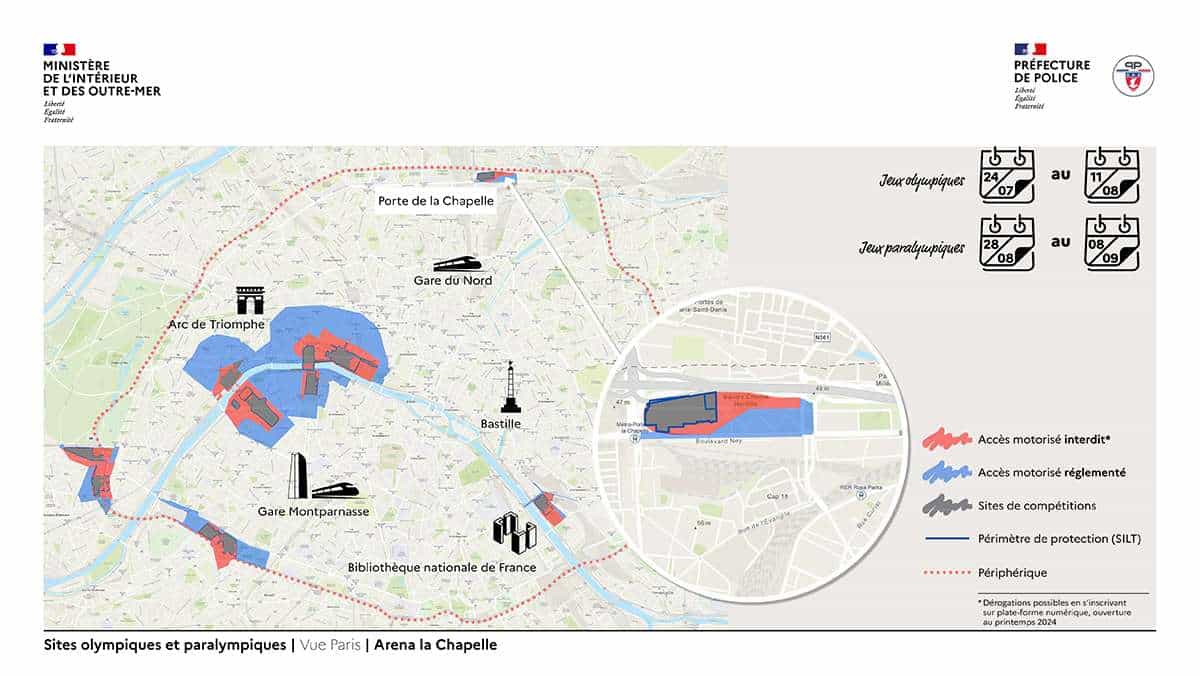
Paris Olympics 2024 Digital Pass
The areas around the competition venues include 4 perimeters where motorised traffic is prohibited and regulated, designed to protect the flow of spectators to the Olympic and Paralympic venues. They will be activated every event day on site, 2 hours and 30 minutes before the first competition and 1 hour after the last.
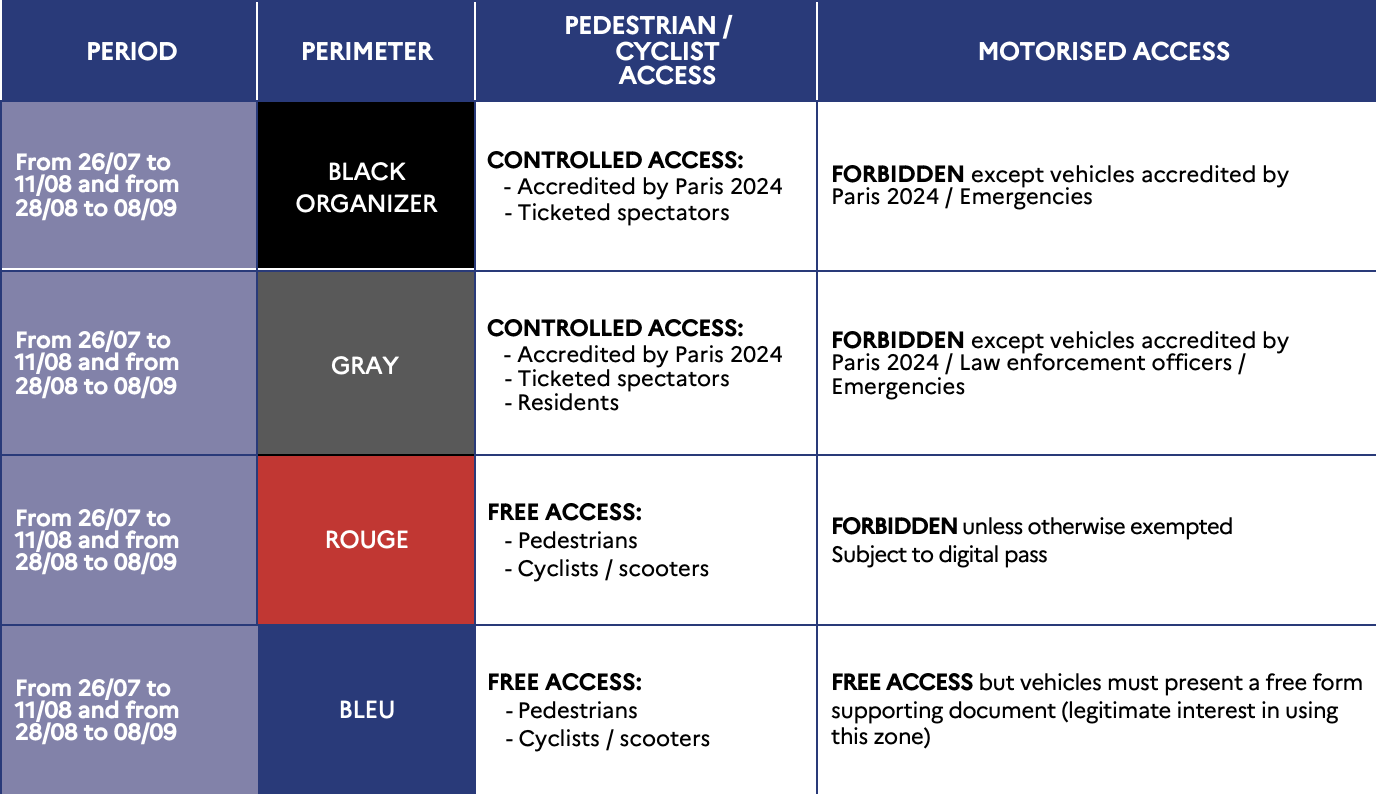
To enter a red perimeter with a taxi, private driver and motorized traffic, you need a digital pass.
Paris Olympics 2024 Calendar
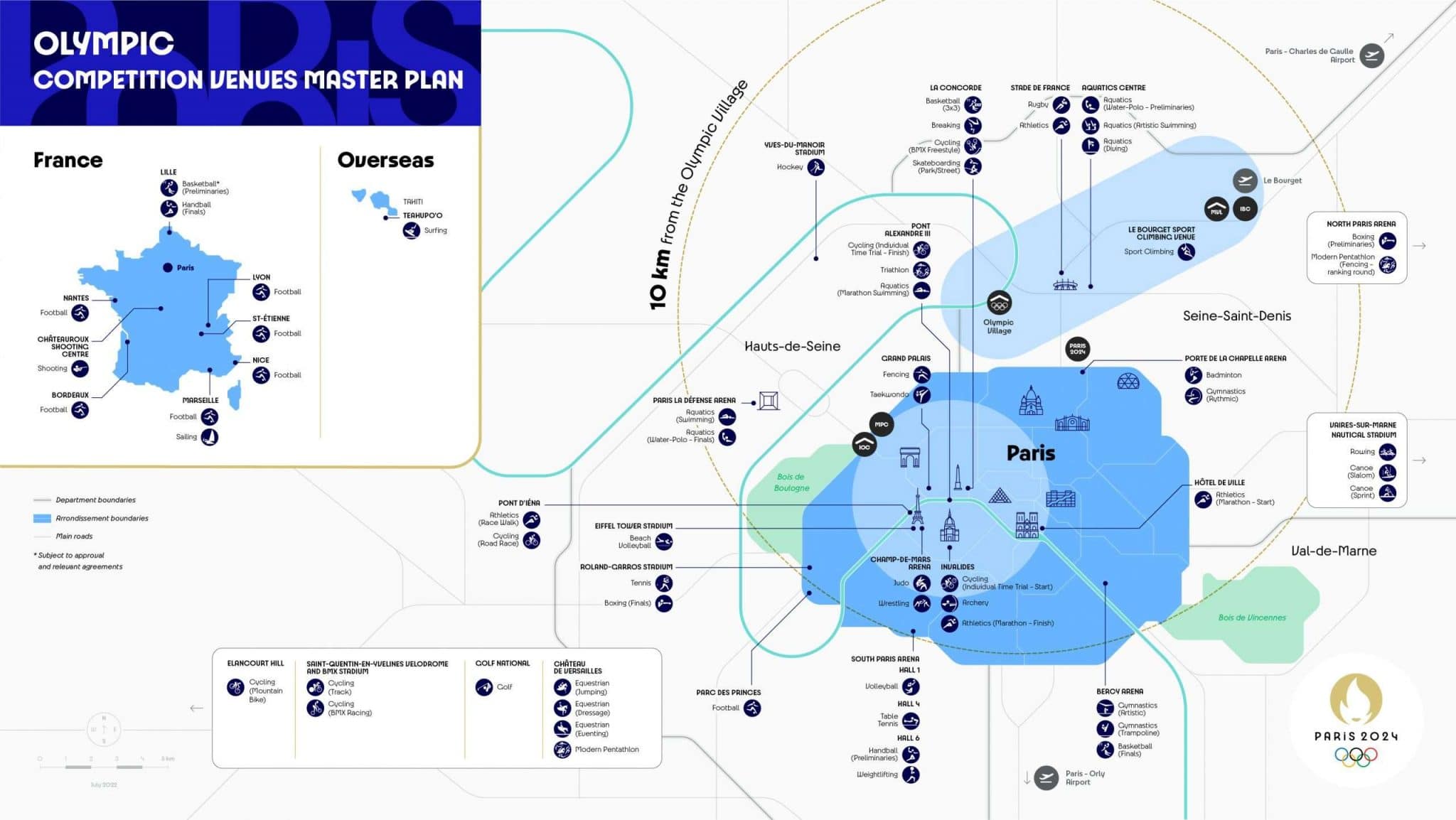
- Athletics: from August 1 to 11 at the Stade de France. Medal presentations are planned during all sessions.
- Rowing: from July 27 to August 3 at the Vaires-sur-Marne Nautical Stadium. Medal presentations are planned for the sessions of July 31, August 1, 2 and 3.
- Badminton: from July 27 to August 5 at the Arena Porte de la Chapelle. Medal presentations are planned for the sessions of August 2, 3, 4 and 5.
- Basketball: from July 27 to August 11 at the Stade Pierre Mauroy and the Arena Bercy. Medal presentations are planned for the sessions of August 10 and 11.
- 3×3 basketball: from July 30 to August 5 at La Concorde. Medal presentations are planned for the August 5 session.
- BMX freestyle: July 30 to 31 at La Concorde. Medal presentations are planned for the July 31 session.
- BMX race: from August 1 to 2 at the BMX Stadium in Saint-Quentin-en-Yvelines. Medal presentations are planned for the August 2 session.
- Boxing: from July 27 to August 10 at the Arena Paris Nord and the Stade Roland-Garros. Medal presentations are planned for the sessions of August 6, 7, 8, 9 and 10.
- Breaking dance: August 9 to 10 at La Concorde. Medal presentations are planned during all sessions.
- Canoe slalom: from July 27 to August 5 at the Vaires-sur-Marne Nautical Stadium. Medal presentations are planned for the sessions of July 28, 29 and 31 and August 1 and 5.
- Canoe sprint: from August 6 to 10 at the Vaires-sur-Marne Nautical Stadium. Medal presentations are planned for the sessions of August 8, 9 and 10.
- Track cycling: from August 5 to 11 at the Saint-Quentin-en-Yvelines national Vélodrome. Medal presentations are planned during all sessions.
- Road cycling: from July 27 to August 4 at the Pont d’Iéna, Les Invalides and the Alexandre III bridge. Medal presentations are planned during all sessions.
- Sport climbing: from August 5 to 10 at the Bourget climbing site. Medal presentations are planned for the sessions of August 7, 8, 9 and 10.
- Fencing: from July 27 to August 4 at the Grand Palais. Medal presentations are planned during all sessions.
- Armchair fencing: from September 3 to 7 at the Grand Palais. Medal presentations are planned during all sessions.
- Football: from July 24 to August 10 at the Parc des Princes, Stade de Nantes, Stade de Bordeaux, Stade de Marseille, Stade de Nice, Stade Geoffroy-Guichard and Stade de Lyon. Medal presentations are planned for the sessions of August 8, 9 and 10.
- Golf: from August 1 to 10 at the Golf National. Medal presentations are planned for the sessions of August 4 and 10.
- Artistic gymnastics: from July 27 to August 5 at the Arena Bercy. Medal presentations are planned for the sessions of July 29, 30 and 31 and August 1, 3, 4 and 5.
- Rhythmic gymnastics: from August 8 to 10 at the Arena Porte de la Chapelle. Medal presentations are planned for the sessions of August 9 and 10.
- Weightlifting: from August 7 to 11 at the Arena Paris Sud 6. Medal presentations are planned during all sessions.
- Handball: from July 25 to August 11 at the Stade Pierre Mauroy and the Arena Paris Sud 6. Medal presentations are planned for the sessions of August 10 and 11.
- Hockey: from July 27 to August 9 at Stade Yves-du-Manoir. Medal presentations are planned for the sessions of August 8 and 9.
- Judo: from July 27 to August 3 at the Arena Champ de Mars. Medal presentations are planned during all sessions.
- Wrestling: August 5 to 11 at the Arena Champ de Mars. Medal presentations are planned for the sessions of August 6, 7, 8, 9, 10 and 11.
- Swimming: from July 27 to August 4 at Paris La Défense Arena. Medal presentations are planned during all sessions.
- Artistic swimming: from August 5 to 10 at the Aquatic Center. Medal presentations are planned for the sessions of August 7 and 10.
- Marathon swimming: August 8 to 9 at the Alexandre III bridge. Medal presentations are planned during all sessions.
- Modern pentathlon: from August 8 to 11 at the Château de Versailles and the Arena Paris Nord. Medal presentations are planned for the sessions of August 10 and 11.
- Diving: from July 27 to August 10 at the Aquatic Center. Medal presentations are planned for the sessions of July 27, 29 and 31 and August 2, 6, 8, 9 and 10.
- Rugby: from July 24 to 30 at the Stade de France. Medal presentations are planned for the sessions of July 27 and 30.
- Skateboarding: from July 27 to August 7 at La Concorde. Medal presentations are planned during all sessions.
- Equestrian Sports: from July 27 to August 6 at the Château de Versailles. Medal presentations are planned for the sessions of July 29 and August 2, 3, 4 and 6.
- Surfing: July 27 to 30 in Teahupo’o, Tahiti. Medal presentations are planned for the July 30 session.
- Taekwondo: August 7 to 10 at the Grand Palais. Medal presentations are planned during all sessions.
- Tennis: from July 27 to August 4 at the Stade Roland-Garros. Medal presentations are planned for the sessions of August 2, 3 and 4.
- Table tennis: from July 27 to August 10 at the Arena Paris Sud 4. Medal presentations are planned for the sessions of July 30 and August 3, 4, 9 and 10.
- Shooting: from July 27 to August 5 at the Châteauroux National Shooting Center. Medal presentations are planned during all sessions.
- Archery: from July 25 to August 4 at Les Invalides. Medal presentations are planned for the sessions of July 28 and 29 and August 2, 3 and 4.
- Trampoline: August 2 at the Arena Bercy. Medal presentations are planned during this session.
- Triathlon: from July 30 to August 5 at the Alexandre III bridge. Medal presentations are planned during all sessions.
- Sailing: from July 28 to August 8 at the Marseille Marina. Medal presentations are planned for the sessions of August 1, 2, 6, 7 and 8.
- Volleyball: from July 27 to August 11 at the Arena Paris Sud 1. Medal presentations are planned for the sessions of August 9, 10 and 11.
- Beach volleyball: from July 27 to August 10 at the Eiffel Tower stadium. Medal presentations are planned for the sessions of August 9 and 10.
- Mountain biking: July 28 to 29 at Colline d’Elancourt. Medal presentations are planned during all sessions.
- Water polo: from July 27 to August 11 at the Aquatic Center and Paris la Défense Arena. Medal presentations are planned for the sessions of August 10 and 11.
Metro Stations closed during the Paris Olympics 2024
To get an Itinerary with subway/métro, RER, bus, tramway
- Alma Marceau (ligne 9)
- Champs-Élysées Clémenceau (1, 13)
- Cité (4)
- Concorde (1, 8, 12)
- Iéna (9)
- Javel (10)
- Passy (6)
- Quai de la Râpée (5)
- Trocadéro (6, 9)
- Tuileries (1)
- Champ de Mars – tour Eiffel (RER C)
- Musée d’Orsay (RER C)
- Pont de l’Alma (RER C)
Bridges After the Opening Ceremony
After the opening ceremony, the dismantling will allow partial and then total opening of the bridges.
- Trocadéro: reopening to traffic from July 27;
- Austerlitz Bridge: Partial reopening from July 27;
July 29: Quays of the Seine
– Partial reopening to traffic of the high platforms
– Release of rights of way on the quay of Béthune and Orléans
– Partial reopening to traffic of the lower quays
– Total reopening of the Pont de la Concorde;
– Total reopening of Pont des Arts;
– Reopening of the Debilly footbridge;
July 30: Quays of the Seine
– Reopening of the Saint-Michel bridge to general traffic
– Total reopening of the Pont de la Tournelle on July 30 at 6 a.m.
– Total reopening of the Pont au Change on July 30
– Total reopening of the Pont Royal
– Total reopening of the Pont de l’Alma
July 31 : Quays of the Seine
Total reopening of the Pont du Carrousel
August 1: Quays of the Seine
– Reopening of the Tino Rossi garden to the public
– Total reopening of the Pont d’Austerlitz
– Reopening of the Marceline Lloridan Ivans promenade
August 2: Quays of the Seine
– Reopening of the Rives de Seine park on the right bank on August 2
– Reopening to the public of the Ports of La Tournelle and Montebello (low quay – left bank), Port Debilly (low quay – right bank)
August 4: end of dismantling on the high platforms
August 5: Reopening of the Conference Port
August 12-August 25: liberation of the entire area (excluding the Alexandre-III bridge for Paralympic events in the Seine)
The Legacy of Paris Olympics
The Olympic Games have a long history in Paris, dating back to the year 1900 when the city first hosted the event. Since then, Paris has been the backdrop for several memorable Olympic moments, including the legendary Jesse Owens’ triumph in 1936 and the iconic 1968 Black Power salute by American athletes Tommie Smith and John Carlos.
After a gap of a century, Paris is all set to welcome the Olympics. The 2024 Games will mark the 100th anniversary of the last time Paris hosted the Olympics.
The Paris Olympics 2024 promises to be a true sports extravaganza with a record number of events and athletes. With 32 sports, 306 events, and over 11,000 athletes from around the globe, it will be a showcase of the world’s best talents competing in disciplines ranging from swimming to skateboarding.
One of the highlights of the 2024 Olympics is the inclusion of new and exciting sports. Fans can look forward to watching skateboarding, surfing, and sport climbing, which will make their Olympic debut.
A revival in Paris
A number of initiatives to re-establish an international sporting event were attempted at the end of the 19th century, but failed due to the lack of coordination among the worldwide sporting movement – until one man decided to bring the main stakeholders together in Paris. The Olympic Games were therefore revived at the first Olympic Congress, organized by Baron Pierre de Coubertin and held at the Grand Amphitheatre at the Sorbonne University from 16 to 23 June 1894. Two thousand people attended, including 58 French delegates representing 24 sports organizations and clubs, and 20 delegates from Belgium, Great Britain, Greece, Ireland, Italy, Russia, Spain, Sweden and the United States representing 13 foreign sports federations.
As the congress came to an end on 23 June, the Olympic Games were reborn and the International Olympic Committee created. The principles that guided Baron Pierre de Coubertin in this endeavor and inspired Olympism and the Olympic movement include :
- Promoting the development of the physical and mental qualities that form the foundation of sport;
- Educating young people through sport in a spirit of mutual understanding and friendship with a view to help build a better, more peaceful world;
- Sharing the Olympic ideals with the whole world and creating an international sense of goodwill; and
- Bringing together athletes from all over the world for a major celebration of sport every four years, the Olympic Games.
Women finally allowed to take part
The first Olympic Games of the modern era took place in Athens, in the country where the original Games took place in Antiquity, in April 1896. Paris hosted the second Games in 1900.
The Paris 1900 Olympic Games saw women compete for the first time. The first female Olympic champion was Charlotte Cooper, a British tennis player who won Wimbledon five times. Out of a total of 997 athletes, 22 were women, competing in just five sports: tennis, sailing, croquet, equestrian events and golf. Of these disciplines, only golf and tennis included women‑only events. According to the Olympic Charter, the IOC’s role is “to encourage and support the promotion of women in sport at all levels and in all structures, with a view to implementing the principle of equality of men and women”. Female participation in the Olympic Games has increased dramatically since; 48.9% of the athletes at the 2020 Tokyo Games are expected to be women, as opposed to 23% at the 1984 Los Angeles Games and just 13% at the 1964 Tokyo Games. The IOC has been working with international federations as well as the Olympic Games Organizing Committees to increase the number of women’s events at the Games for over 20 years. By adding a women’s boxing event, the Games in London in 2012 were the first where women competed in all sports of the Olympic programme. At the Olympic Games in Rio in 2016, 45% (5,059 women out of a total of 11,238) of the athletes were women. The Games of Tokyo in 2021 were the most equal yet, with 48.9% women athletes.
The development of the Games over the centuries
The 1904 Olympic Games in St. Louis (Missouri) were the first to distribute gold, silver and bronze medals, and also included the first known disabled athlete to compete in the Olympic Games, George Eyser. He won six medals in gymnastics, three of which were gold.
The Olympic Games in Stockholm in 1912 were the first to include competitors from all five continents represented by the Olympic rings. It was also the year that women made their debut in the swimming events.
From 1912 to 1948, artistic competitions were part of the modern Olympic Games, on the initiative of Pierre de Coubertin. Medals were awarded for sport‑related artwork falling in five categories: architecture, literature, music, painting and sculpture. In 1920, the Games continued after having been cancelled in 1916 due to World War I. The Olympic flag and the Olympic Oath, written by Pierre de Coubertin, were revealed at the Games in Antwerp.
“We swear that we will take part in the Olympic Games in a spirit of chivalry, for the honour of our country and for the glory of sport.”
1924
The Olympic Games were held for the second and third times in France – in Chamonix from January to February for the first ever Winter Olympic Games, then in Paris again in the summer. The Olympic motto of “citius, altius, fortius” (faster, higher, stronger), used by Pierre de Coubertin since 1896 and taken from the priest Henri Didon, was also highlighted that year.
The Paris Olympic Games of 1924 were the first to build an Olympic Village, which has become customary at every Games since.
1932
During the Winter Olympic Games in Lake Placid, New York, a woman acted as the flag‑bearer for an Olympic delegation for the first time; that woman was Mollie Phillips, a figure skater for Great Britain.
1936
The Winter and Summer Olympic Games took place in Germany, in Garmisch-Partenkirchen and Berlin respectively. For the first time, the spectacle of the opening ceremony was broadcast live — an incredible development. Between big screens set up in Germany and the few households owning television sets, around 150,000 viewers tuned in. However, the Games served as a propaganda tool for Nazi Germany; the epitome of this was Leni Riefenstahl’s documentary film of the Games in Berlin, Olympia, which served as a monument to Nazism.
It was also at the Berlin Games in 1936 that the Olympic flame was introduced for the first time.
1940-1944
the Olympic Games of the XII and XIII Olympiads were cancelled due to the ongoing World War II.
The Winter Olympic Games held at St Moritz in 1948 were therefore named “The Games of Renewal”.
1952
The Winter Olympic Games in Oslo were declared open by a woman for the first time – Princess Ragnhild of Norway.
1960
The ninth Stoke Mandeville Games were held in the same city as the Olympic Games, Rome, one week later. This event is considered to be the first ever Paralympic Games.
1968
The Grenoble Olympic Games were broadcasted live and in colour on television for the first time.
1988
Since the Games in Séoul, the Olympic and Paralympic Games have always taken place in the same city, separated by just a few weeks.
1994
The Winter Games were held in Lillehammer , just two years after the last Winter Games in Albertville, in 1992. This adjustment was made so that the Winter Games would no longer be held in the same year as the Summer Olympics, which take place in the first year of each Olympiad.
1996
For the first time in Olympic history, all 197 of the National Olympic Committees (NOC) were represented at the Summer Olympics in Atlanta. Of those NOCs, 79 won medals, with 53 taking gold.
That same year, Italian archer Paola Fantato became the first athlete to compete in the Olympic and Paralympic Games in the same year.
2000
At the Olympic Games in Sydney, North and South Korea marched together under the same flag at the opening ceremony. This was an unprecedented symbol of peace since diplomatic relations between the two states had ended after the Korean War of 1950 to 1953.
2003
The legacy concept was added to the document that sets out the rules for governing the Olympic movement, the Olympic Charter. This addition came about after a period of reflection in the 1990s, with the Games in Barcelona in 1992 serving as an example. The Olympic Games needed to be seen as more than just a periodic sport event, but also a way to bring about urban development and have a positive impact on the society where they take place. From now on, to be selected by the International Olympic Committee (IOC), applicant cities must have a long‑term plan.
2004
The Iraqi football team stunned at the Games in Athens. Despite the war ravaging their country, the team reached the semi‑finals of the tournament, offering a brief distraction for Iraqis and the entire world from their country’s dramatic situation. That same year was the first time that the Olympic torch relay, after leaving Olympia, crossed every habitable continent before returning to Greece.
2010
The first summer version of the Youth Olympic Games took place in 2010, with the first winter version taking place in 2012 — proof of the Olympic movement’s strong commitment to youth and education.
2014
The 127th Session of the IOC took place in Monaco on 8 December and approved to modify the Olympic Charter by adding: “any form of discrimination with regard to a country or a person on grounds of race, religion, politics, gender or otherwise is incompatible with belonging to the Olympic Movement”.
Today
Olympism is defined by its universality, as demonstrated by its continuous development and worldwide presence on every habitable continent. There are 206 NOCs in the IOC, compared to the 193 member states of the UN for example. This universality gives unparalleled reach to the movement’s ongoing efforts to promote people and education.
Sustainability and Innovation
The Paris Olympics 2024 is committed to being the most sustainable Games ever. With a focus on reducing carbon emissions and promoting eco-friendly practices, it aims to set a benchmark for future sporting events. From solar-powered stadiums to sustainable athlete villages, Paris is going green in style.
In addition to sustainability, innovation will play a significant role in the 2024 Olympics. The integration of cutting-edge technology, including virtual reality broadcasts and advanced data analytics, will enhance the viewing experience for fans.
Culture and Unity during the Games
The Paris Olympics will not only be about sports but also a celebration of culture and art. French culture, with its rich history of art and cuisine, will be on full display. Expect mesmerizing opening and closing ceremonies, art exhibitions, and a diverse culinary experience that will tantalize the taste buds of visitors.
The Olympics have always been a symbol of unity and harmony. In a world that often seems divided, the 2024 Paris Olympics will bring together nations from every corner of the globe, transcending political and cultural boundaries, and reminding us of the power of sports to unite humanity.

Private Car Service with Electric Vehicule
While exploring this enchanting city, PARIS BY EMY and its business partners are opting for a greener mode of transportation thanks to electric vehicle such as the Mercedes EQV van. Switching to electric vehicles (EVs), drivers help to reduce emissions of nitrogen oxides and leading to cleaner air thus improving respiratory health for residents and visitors alike.
Choosing to explore Paris in EVs, travelers contributes to more sustainability. PARIS BY EMY and its business partners want to demonstrate the quality of its luxuring touring services in Paris with certified VTC drivers as well for a wealth, growth & social well-being.
By eliminating the combustion of fossil fuels, EVs help decrease the release of carbon dioxide and other pollutants into the atmosphere, thereby mitigating climate change and its associated impacts.
Paris Olympics 2024
The Paris Olympics 2024 is not just a sporting event; it’s a celebration of history, culture, sustainability, and unity. As the world eagerly awaits the opening ceremony, we can all look forward to witnessing extraordinary athletic achievements, experiencing the magic of Parisian culture, and cherishing the values that the Olympics represent.
Emy,
FAQs
When were the last Olympics held in Paris before 2024?
The last Olympics in Paris were held in 1924, making the 2024 Games a centennial celebration.
Which new sports will debut in the Paris Olympics 2024?
Skateboarding, surfing, and sport climbing will make their Olympic debut in 2024, adding excitement to the event.
How is Paris promoting sustainability in the 2024 Olympics?
Paris is implementing eco-friendly practices and using sustainable technologies to reduce carbon emissions.
What makes the Paris Olympics culturally significant?
The Olympics in Paris will showcase French culture, art, and cuisine, adding a unique cultural dimension to the event.
What is the significance of the 2024 Olympics in promoting global unity?
The Olympics serve as a symbol of global unity, bringing nations together and transcending political and cultural differences.


